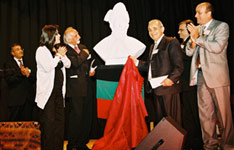By Ali Ahmad
Hungry for Peace
Food is like many other social science subjects a ‘double-edge” sword element. It can save lives. Food can also become a tactic for protest when people refuse to eat food in order to seek justice whether in public view or in private spaces such as detention centers where hunger strikes are a common way of reclaiming one’s humanity even for those who have been ostracized by society. Peace Museum Vienna’s Peace Hero, Mahatma Gandhi used hunger strikes as a protest tactic many times in his life against the British rule in India and mainstreamed nonviolence as a meaningful means to bringing about positive societal change.
We at Peace Museum Vienna seek to deepen cultural understanding through food as we feel cultural understanding is the first step towards peace. The recent Peace Kitchen event was supported by The Afghanistan Cultural Association based in Vienna in order to present a different and peace-loving image of its people as a direct parallel to the war and terror associated with Afghanistan in popular perception. Each nation has its unique culture and tradition that gets sidelined during times of war. In fact, cultural awareness is the first step to understand a conflicted space and restore its humanity.
The keynote speaker of the event, Mr. Ghoussudin Mir of the Afghan Cultural Association delivered his speech on Afghan culture and tradition and the importance of events such as Peace Kitchen. He introduced the Afghan national dish and the process of making it.
So what does food have to do with peace? People love to talk about food no matter where they come from and which culture and tradition they belong to. Food is universal and every culture has a story to tell about food and how it is connected to peace, violence and conflict. Food tends to be taken for granted in more peaceful countries. However, people who live in war-affected countries and food insecure environments understand food in a different way. For many, food is the cause of war and they need to fight for food. On the other hand, food can also build peace through growing, preparing and sharing with others.
At the personal level, many people suggest that peace should come from within. In that case, whatever we eat have a direct impact on how to achieve peace for ourselves.
The Peace Kitchen event began in the courtyard of Peace Museum Vienna in the first district where the major tourist groups visit it on daily basis. The director of Peace Museum Vienna, Dr. Ali Ahmad opened the event with his opening remarks about the importance of “sharing” food with others. He indicated that millions of people around the world have no access to food while billions of dollars are spent on military expenditure. Instead of building up the “defense system” by states, it is easy and more practical to spend the military expenses on humanity. “Weapons destroy life but food gives life,” Dr. Ali said.
The founder of Peace Museum Vienna, Liska Blodgett, expressed her concern over poverty in the world. She emphasized the need for world politicians to pay less attention to war and start focusing on peace. Ms. Blodgett urged the participants of the peace kitchen event to spread the word of peace in their communities and where they live. “It is urgent to raise awareness on peace among each community and each of us is responsible for raising peace consciousness,” Liska said.
Mr. Mir emphasized on disarmament of state and non-state actors. He believes that as long as the west continues to its hypocrisy by manufacturing more and more weaponry, peace seems unlikely on earth. “We lie to ourselves that we love peace and we work for peace. We can not achieve peace as long as the West manufactures and then distributes weapons to state and non-state actors to kill people,” Mir reiterated.
In the second part of the event, Ishaq Rameshgar, an Afghan musician played traditional Afghan love songs on a Tambura, a traditional instrument. Tambura is two-string instrument with a long neck and is a popular accompaniment to folk songs in the Indian sub-continent.
The music was followed by an intense discussion on Mawlana Jalaluddin Rumi Balkhi and his poetry. Mawlana was a 13th-century Persian poet, jurist, theologian, and Sufi mystic from Afghanistan. Mawlana has been recently recognized as the newest Peace Hero by Peace Museum Vienna.
Both light and shadow
are the dance of Love.
Love has no cause;
it is the astrolabe of God’s secrets.
Lover and Loving are inseparable
and timeless.
Although I may try to describe Love
when I experience it I am speechless.
Although I may try to write about Love
I am rendered helpless;
my pen breaks and the paper slips away
at the ineffable place
where Lover, Loving and Loved are one.
Every moment is made glorious
by the light of Love.
Mawlana Jalaluddin Rumi Balkhi




